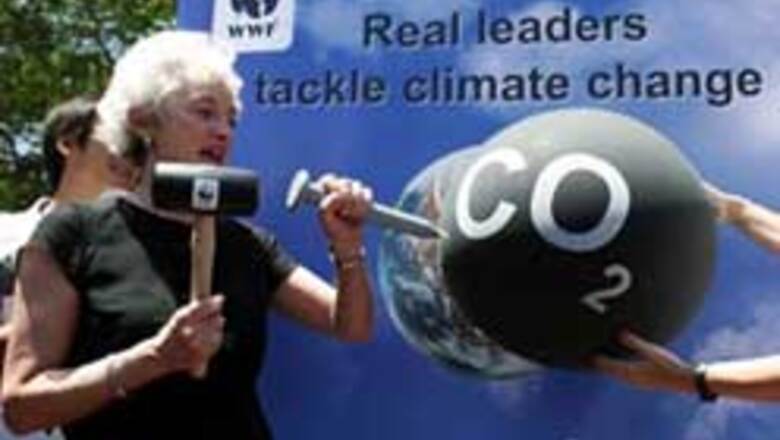
views
Nusa Dua, Bali: Europe expects to overcome a dispute with the United States blocking the launch of negotiations on a new climate treaty beyond 2012 at the UN talks in Bali, Germany said on the final day on Friday.
"All parties are willing to be flexible, to search for a compromise," said German Environment Minister Sigmar Gabriel, playing down a long-running clash with the United States over how far rich nations should cut greenhouse gases by 2020.
"I think that the situation is good, the climate in the climate conference is good, that we will have success in the end," he said. "I don't know when we will come to an end."
Indonesia, hosting the December 3-14 talks in Bali, had suggested dropping an ambition for rich nations to make stiff cuts in emissions of between 25 to 40 per cent by 2020 in a bid to overcome Washington's opposition to a draft text.
The United States, the world's top emitter of greenhouse gases and the only developed nation outside the 37-country Kyoto, has repeatedly said that setting a 2020 goal would prejudge the outcome of coming negotiations.
Earlier, the EU insisted the rich should lead the way in curbing emissions to persuade developing nations, such as China and India, to agree in Bali to launch two years of negotiations on a global climate pact to succeed the UN's Kyoto Protocol.
"We continue to insist on including a reference to an indicative emissions reduction range for developed countries for 2020," European Environment Commissioner Stavros Dimas said.
"Let me underline once again that the Bali 'roadmap' must have a clear destination," he said. Reading a statement, he did not, however, repeat the 25 to 40 percent demand.
Gabriel would not say what had caused his more optimistic tone.
One compromise draft by Indonesia retains an ambition for global greenhouse gas emissions to peak in the next 10-15 years and to fall well below half of 2000 levels by 2050. But it drops the 25-40 per cent range for rich nations by 2020.
It was not clear if the United States and other countries would agree to the text. Indonesia presented an alternative with the 2020 goals, as part of a drive to avert climate changes such as more heatwaves, floods, rising seas and melting glaciers.
PAGE_BREAK
The Return of Ban
The United States did not want to distinguish between climate efforts by rich and poor countries, isolating it from the G77 group of developing nations and the European Union.
UN Secretary-General Ban Ki-moon warned of the risks of failure in Bali. "That would be very serious," he said, but added: "I think there will be an agreement." Organizers say the talks may last overnight into Saturday.
Ban, on a visit to East Timor after attending the Bali talks, would make an unscheduled return on Saturday morning to give a news conference, his spokeswoman Michelle Montas said.
Yvo de Boer, head of the UN Climate Change Secretariat, said most nations considered it vital to include the United States in a new climate treaty.
"The general sense of everyone here is that it doesn't make a lot of sense to begin crafting a post-2012 climate change regime without the major economy and the major emitter," he said.
Outside the conference centre, activists wearing red T-shirts reading "Kyoto - just do it" chanted "breakthrough, breakthrough".
Developing nations are exempt from Kyoto's 2008-2012 first phase. Despite opposition to Kyoto, the United States plans to join a new treaty, meant to be agreed in Copenhagen in late 2009 with participation of developing nations led by China and India.
On other issues, the Bali talks agreed steps on Friday to slow deforestation. Trees store carbon dioxide as they grow.
"The agreement on deforestation is a good balance between different countries views and is one of the substantial achievements of this conference," Dimas said.
He said the agreement launched pilot projects, which would tackle deforestation and forest degradation, and contribute to harder proposals in a broader climate pact in 2009.




















Comments
0 comment